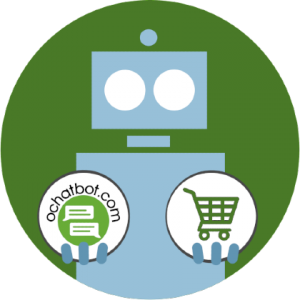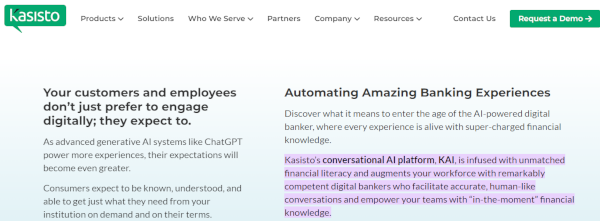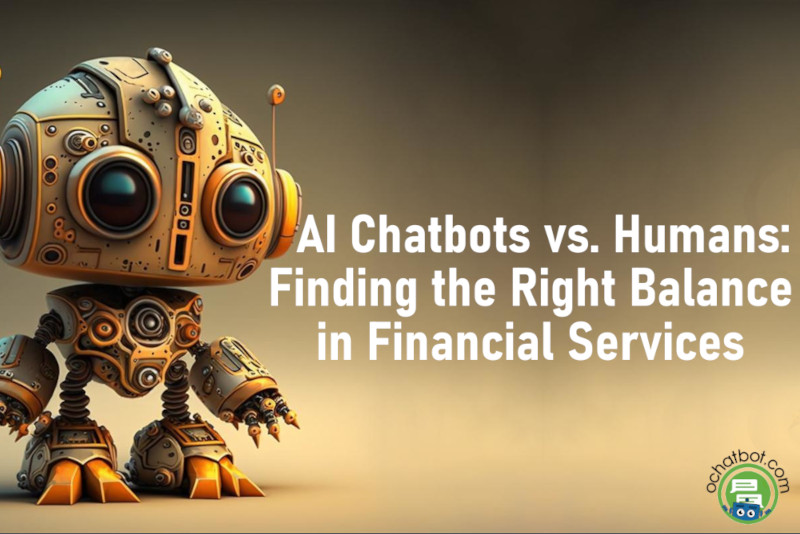The financial services industry is currently going through a significant transformation, and a major driving force behind this change is the integration of artificial intelligence (AI) and chatbots into various aspects of the sector. As technology advances, it begs the question: are AI chatbots on the brink of replacing human financial advisors, or can they work in tandem to enhance the overall customer experience?

In this article, we’re going to explore the intricate relationship between AI chatbots and human advisors and understand why striking the right balance is crucial for delivering top-notch financial services.
The Emergence of AI Chatbots in Financial Services
The integration of AI chatbots in the financial services industry has been gaining momentum, and it’s not hard to see why. These virtual assistants bring an array of benefits, including speed, accessibility, and cost-efficiency. AI chatbots can provide customer support round the clock, swiftly respond to queries, and manage routine tasks, freeing up human advisors to focus on more intricate and personalized services.
The Human Element in Financial Services
Human financial advisors have been a cornerstone of the industry for quite some time. They provide personalized advice, empathy, and a level of understanding that AI chatbots currently cannot replicate. When it comes to making complex financial decisions, such as planning for retirement, managing estates, or assessing risks, many individuals still prefer the guidance and expertise of a human advisor. The personal touch that human advisors bring can be especially reassuring during turbulent financial times when emotions tend to run high.
AI Chatbots in Action: A Case Study from FX Brokers
Several reputable forex brokers such as B2B broker, FXPro, and others have incorporated AI chatbots to enhance the trading experience for their clients. These AI-powered chatbots are designed to provide real-time information, assist with queries, and even offer trading recommendations. By doing so, they ensure traders have access to timely and accurate data, making informed decisions in the dynamic forex market.
For detailed information on forex brokers that offer AI chatbot services, you can explore forexbrokers.io. This platform provides comprehensive insights and reviews of various brokers, helping traders make informed choices to meet their specific needs. With the growing influence of AI in the financial industry, these chatbots serve as valuable tools for traders, offering efficiency and support throughout their trading journey.

Generative and Scripted AI to engage shoppers in conversational eCommerce.
Create happy customers while growing your business!
-
1 out of 4 shoppers make a purchase on average*
-
5% to 35% Increase in AOV*
-
25% to 45% Reduction in Support Tickets
WE GUARANTEE RESULTS!
AI Chatbots: A Valuable Resource for Routine Tasks
AI chatbots excel in handling routine and repetitive tasks, such as addressing frequently asked questions, processing transactions, or providing updates on account balances. They can complete these tasks swiftly and without the risk of human error, making them a valuable asset for financial institutions looking to streamline their operations.
For example, a bank may employ an AI chatbot to assist customers in checking their account balances, transferring funds, or even applying for a credit card. These are everyday inquiries that don’t necessarily require the expertise of a human advisor.
Human Advisors: Adding the Personal Touch
While AI chatbots shine in routine tasks and swift information delivery, they often fall short when it comes to the personal touch that human advisors provide. Financial decisions are deeply personal, and many individuals seek guidance from human advisors who can understand their unique circumstances, emotions, and long-term goals.
For instance, someone planning for retirement may have a multitude of questions and concerns, such as how much to save, which investment options to choose, and how to manage their assets in retirement. These intricate financial decisions are best handled by human advisors who can offer personalized guidance, empathetic communication, and a profound understanding of the individual’s financial situation and aspirations.
Which AI Chatbots Can Give The Best Service to Financial Traders?

AlphaSense
AlphaSense is an AI-powered chatbot designed to assist traders and investors in making more informed decisions. It specializes in natural language processing and can swiftly analyze vast amounts of financial and market data.
This chatbot enables traders to receive instant updates on relevant news, earnings reports, and key events that might affect their portfolios. AlphaSense’s intelligent search capabilities are particularly valuable, allowing users to find critical information that traditional keyword-based searches might miss. This chatbot is widely used in the financial industry, providing traders with an edge in staying ahead of market trends and making well-informed trading decisions.

KAI
KAI, developed by Kasisto, is another notable AI chatbot used in the trading and financial sector. It’s specifically designed for banking and finance applications and is utilized by various financial institutions.
KAI offers traders the ability to have natural conversations about their investments, ask questions, and receive detailed insights on their portfolios. The chatbot leverages machine learning to understand and respond to user queries in a conversational manner. It can also perform account management tasks and facilitate trades, making it a valuable tool for traders who prefer a conversational interface.

IBM Watson
IBM Watson is a versatile AI platform that has found its way into the trading industry. It offers a wide range of AI and machine learning tools that can be customized to suit traders’ specific needs.
Watson can analyze market data, news, and social media sentiment to provide traders with valuable insights and predictive analytics. Additionally, Watson’s natural language processing capabilities enable traders to interact with it in a conversational manner. IBM Watson’s flexibility and adaptability make it a powerful asset for traders looking to harness AI’s capabilities in their trading strategies.
These AI chatbots exemplify the increasing integration of artificial intelligence in the world of trading. They help traders access and process data more efficiently, make informed decisions, and improve their overall trading experience. It’s worth noting that the choice of an AI chatbot largely depends on a trader’s specific requirements, preferences, and the level of automation they seek in their trading activities. As technology continues to advance, we can expect to see even more innovative AI chatbots tailored to the unique needs of traders in the financial markets.
Striking a Balance Between AI Chatbots and Human Advisors
The future of financial services hinges on finding the right balance between AI chatbots and human advisors. Each has its own strengths, and their collaboration can create a comprehensive and efficient customer experience.
- Efficiency and Speed: AI chatbots are adept at handling routine tasks with efficiency and speed. Operational around the clock, these AI chatbots ensure that customers have access to information and support at their convenience. This effectiveness allows human advisors to allocate their attention to more intricate issues.
- Personalization and Empathy: Human advisors bring the personal touch and empathy that AI chatbots currently lack. They excel in understanding an individual’s unique financial situation, emotional state, and long-term goals, allowing for tailored financial advice.
- Cost-Effectiveness: AI chatbots have the capacity to bring about substantial cost reductions for financial institutions by automating mundane tasks. These cost efficiencies can then be transferred to customers through reduced fees or improved services.
Using Without Balance: Risks Associated With Depending Only AI Bots or Only Human Advisors
Balancing the roles of AI chatbots and human advisors is essential for creating a comprehensive and well-rounded trading experience. However, there are certain inherent risks associated with upsetting this equilibrium, where either AI or human advisors become overwhelmingly dominant.
Emotional Intelligence and Empathy
One of the primary advantages of human advisors is their ability to provide emotional support and empathy during turbulent market situations. They understand the psychological aspects of trading, including emotions like fear and greed, and offer reassuring guidance. In contrast, AI chatbots, although proficient in data analysis, lack the capacity for empathy and emotional intelligence. If human advisors are sidelined in favor of AI, traders may struggle to find the emotional support they require when navigating market fluctuations.
Handling Unpredictable Events
Financial markets are inherently unpredictable, and unforeseen events can have a significant impact on trading decisions. Human advisors possess the ability to adapt to unexpected circumstances and make nuanced judgments. AI chatbots, on the other hand, operate based on pre-programmed algorithms and historical data, making them ill-prepared to handle unprecedented events that can disrupt the market.
Over-Reliance on AI for Complex Decision-Making
AI chatbots excel in automating routine tasks, data analysis, and offering real-time information. However, there’s a risk of traders becoming overly reliant on AI for complex decision-making, such as portfolio diversification and long-term investment strategies. This can lead to a lack of critical thinking and understanding of the rationale behind trading decisions.
Vulnerability to Technical Glitches and Errors
AI chatbots are not immune to technical glitches and errors, which can have severe consequences in trading. System failures or algorithm errors can result in erroneous trades, financial losses, and even reputational damage. Relying solely on AI chatbots without human oversight can exacerbate the risks associated with technical failures.
Disconnection from Client Needs and Goals
Human advisors establish relationships with traders, understanding their individual financial goals, risk tolerance, and preferences. AI chatbots, despite their ability to provide data-driven recommendations, may lack the human touch required to tailor advice to a trader’s unique needs. An overreliance on AI could lead to a disconnection between traders and their financial objectives.
In Closing: AI Chatbots will Improve Your Experience in Financial Services
AI chatbots and human advisors in the financial services industry don’t have to be competitors; instead, they can collaborate to deliver a superior customer experience. By leveraging the strengths of each, financial institutions can streamline their operations, provide timely information, and offer personalized advice when it’s most needed.
The case study of the Forexbrokers.io chatbot demonstrates how this synergy is already being put into practice in the world of trading. Traders can benefit from quick access to information while still having the option to consult human advisors for more complex financial decisions. This balanced approach holds the key to the future of financial services, ensuring that customers get the best of both worlds – the efficiency of AI chatbots and the personal touch of human advisors.
- The Rise of Intelligent Websites - February 19, 2025
- Top Trending Products to Boost Your Shopify Store in 2024 - September 4, 2024
- AI Terms Glossary: Key AI Concepts You Should Know - August 22, 2024


